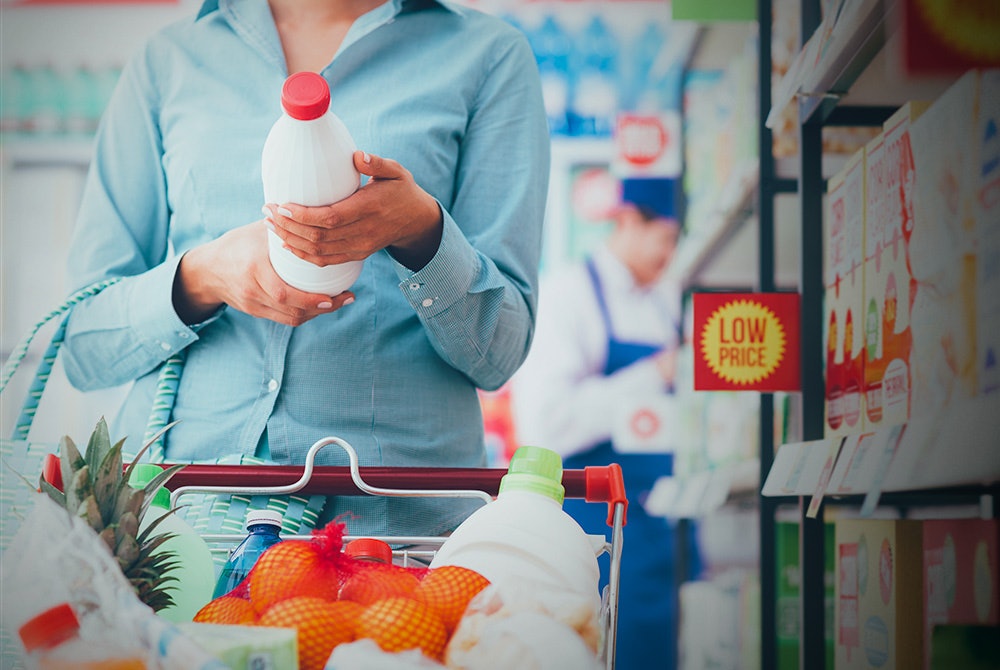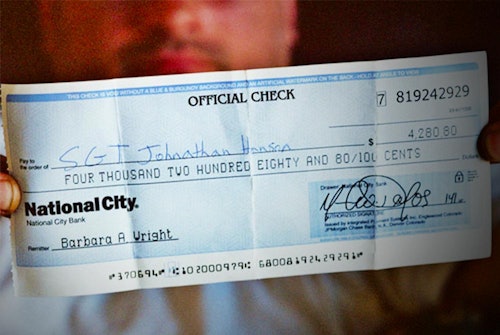- Common Discount Foods
- General Discount Food Guidelines
- Food Expiration Date Guidelines
- Foods That Don’t Expire
- Expired Foods To Always Avoid
- When to Eat Refrigerated Foods By
- When to Eat Pantry Foods By
- Possible Consequences of Eating Expired Food
We all like to save money—and we all need to eat. That’s why many people will look for discount foods at the grocery store. But while this shopping strategy is good for your wallet, is it a good idea for your body?
Common Discount Foods
Whether they’re marked as discount foods, sales items, or managers’ specials, there is almost always something with a marked-down price at the grocery store.
Foods may get this special sale treatment for many reasons, including if the packaging has been damaged (but the product is intact) or if the store simply wants to make more room on its shelves for newer inventory.
Most of the time, though, the discounts get steeper as the expiration date gets nearer.
Grocery stores are far more likely to mark down foods with a short shelf life, those that are out of season, or those close to—or even, sometimes, past—their expiration date.
Some of the most common discount foods you'll find in stores include:
- Meat and fish
- Produce
- Dairy products
- Bakery items, including bread, rolls, tortillas, and desserts
- Fresh (not frozen) pre-made meals
General Discount Food Guidelines
Shopping by food expiration dates may be a clever way to save some money while simultaneously saving the food from being thrown away or wasted. But expired foods aren’t something you want to mess with. They could be extremely dangerous if ingested.
Below are some guidelines to follow if you want to stay both savvy and safe.
- Trust your senses. If you’re unsure whether a food is safe to eat, smell it and look for any signs of aging, including mold. If something seems off—it probably is.
- Keep it fresh. Perishable foods left out at room temperature for more than 2 hours or in hot temperatures for more than half an hour should probably go in the garbage.
- Store it correctly. The way you store food is hugely important and the best way to align how it deteriorates with its expiration date.
- Open packages change the game. Once opened, expiration dates become moot, as the food is subject to outside factors that typically speed up the aging process.
- Refrigerate after opening. This is true of most—though not all—foods. Labels should let you know when this tactic will help your food stay good longer.
- When in doubt, freeze. As a rule, harmful bacteria can’t grow in the freezer, so if your food product is getting close to the edge, you can extend its shelf life with this trick.
- Never freeze jarred or canned food! The cold temperatures can split the cans or crack the glass. Transfer your food to freezer-safe containers first.
Tips for Canned/Jarred Food
When you open cans or jars, write the date on the lid or on a sticky note so you know when it's time to throw them out.
Food Expiration Date Guidelines
When food is past its prime, it may be easy to see, but making that judgment call based on an expiration date can be incredibly complicated.
With the exception of infant formula, food dating is not regulated or even required by U.S. law. The numbers you see on these labels come straight from the manufacturers, who can use whichever set of standards they see fit to produce the date—or leave it off of the packaging altogether.
With that freedom, the food industry has developed several different labels to describe this issue, including “Use By” dates, “Best Before” dates, and food expiration dates.
The intention is to keep us safe, but the result can often be confusing. Below are what these terms mean and the best way to navigate the dates associated with them.
Use By/Best Before Dates
Most often found on canned goods, dry goods, condiments, or other shelf-stable foods, “Use By” dates indicate when manufacturers estimate the food will reach peak quality.
It is generally safe to eat food after its “Use By” date, but you can expect a decline in flavor, texture, or appearance. As such, it’s not uncommon for products past this date to end up at the discounted food counter.
Sell-By Dates
This number is more of an inside communication—or, at least, it’s meant to be.
“Sell By” dates indicate when a manufacturer thinks a store should remove the item from its shelves. They’re typically conservative estimates, with the thought being that someone would have a few days or even weeks to use the product after purchasing it.
For that reason, more likely than not, it will be okay to eat something after its “Sell By” date, but you should still make sure it passes the sniff test or shows no signs of going bad.
Food Expiration Dates
The absolute term on this list, an expiration date, is meant to represent the day when you should toss something out.
Still, even here, you may have a little wiggle room to eat it a day or two after the date, depending on the type of product. By and large, though, it is advised to throw away anything past its expiration date.
Foods That Don’t Expire
You might’ve heard the joke about cockroaches and Twinkies being the only things to survive the apocalypse. That’s because, at least in the case of Twinkies, some foods are just better built to last.
Expired canned food is tough to come by, and several other foods that don’t expire can be found at most grocery stores—or lining the underground shelves of many doomsday preppers.
Some foods that don’t expire (or, at least, take a very long time to) include:
- Nuts. Good for about a year, or freeze them for an even longer life!
- Canned meats and seafood. Typically last around 5 years, if unopened.
- Dried grains. Can last for years if stored properly.
- Dark Chocolate. Good for as long as 4-6 months after its “Sell By” date.
- Canned fruits and veggies. Can last for years if unopened.
- Dried fruit. Good for about a year.
- Canned coconut milk. Good for a year or longer, if unopened.
- Dried beans. Good for years if properly stored.
- Jerky. Good for a year or more in airtight packaging.
- Protein powders. Good for up to 5 years.
- Dehydrated milk. Good for up to 10 years, if unopened.
- Honey. Some people say this food never expires.
- Hard cheese encased in wax. Good for 25 years or longer, if properly stored.
- Coconut oil. Can last for years, even if opened.
- Extra virgin olive oil. A year or more if stored properly.
- Canned olives. Can last for over a year if properly stored.
- Vinegar. In theory, never expires if stored properly.
- Red wine. Good for years or even decades if stored properly.
- Salt. Mold doesn’t grow on it, so it never expires.
- Dried herbs and spices. Can last for years, as long as they’re dry/stored correctly.
Expired Foods To Always Avoid
On the other end of the spectrum are the foods that you should never eat after they’ve expired—whether that’s determined by the date on their packaging or what you can see and smell.
That’s because, while many foods have a bit more wiggle room past the expiration date, others have a very hard deadline. At this point, these foods will not only lose all taste and texture but have the potential to make you extremely sick.
Some of these potential time bombs include:
- Boxed egg substitutes
- Soft cheeses
- Some condiments, including:
- Salsa: Throw out 1 month after opening.
- Mayo: Throw out 2 months after opening.
- Barbecue sauce: Throw out 4 months after opening.
- Ketchup: Throw out 6 months after opening.
- Potato salad
- Cold-pressed juice
- Fresh meat
- Ground meats
- Deli meat
- Fish and shellfish
- Fresh berries
- Leafy greens, including spinach, lettuce, and kale
- Pre-made salads
- Sprouts
When to Eat Refrigerated Foods By
| Food | What To Do | Within |
| Ground or stew meat | Cook or freeze | 1-2 days |
| Fresh meat (beef, veal, lamb, pork) | Cook or freeze | 3-5 days |
| Fresh poultry | Cook or freeze | 1-2 days |
| Lunchmeat (opened) | Eat | 3-5 days |
| Lunchmeat (unopened) | Eat | 2 weeks |
| Fresh fish and shellfish | Cook or freeze | 1-2 days |
| Eggs (fresh in shell) | Eat | 3-5 weeks |
| Milk | Drink | 1-2 weeks |
| Dark chocolate | Eat | 4-6 months |
| Salsa | Eat | 1 month |
| Mayonnaise | Eat | 2 months |
| Barbecue sauce | Eat | 4 months |
| Ketchup | Eat | 6 months |
When to Eat Pantry Foods By
| Food | What To Do | Within |
| Rice | Cook and eat | 2 years |
|
Dried pasta |
Cook and eat |
2 years |
| Unopened high-acid canned foods (e.g., tomatoes, grapefruit, pineapple) | Eat |
12-18 months |
| Unopened low-acid canned foods (e.g., meat, poultry, fish, vegetables) | Eat |
2-6 years |
Possible Consequences of Eating Expired Food
Eating food that’s beyond its expiration date is a huge gamble—and one you’ll seldom win.
The consequences of eating expired food range from mild discomfort to life-threatening situations. That’s because the reason food goes bad, to begin with, is that it’s being broken down by bacteria, mold, and other natural agents that can wreak havoc on the human body.
Some (but not all!) possible consequences of eating expired food include:
- Gas
- Upset stomach
- Nausea
- Diarrhea
- Food poisoning, which can include:
- Vomiting and diarrhea
- Stomach cramps
- Fever or chills
- Foodborne illness from harmful bacteria such as E. coli and Bacteroides.
In particular, foodborne illness can be extremely dangerous and may constitute a trip to the hospital.
So be careful. Being savvy by buying discounted foods is great—but it’s always better to be safe.











Comments